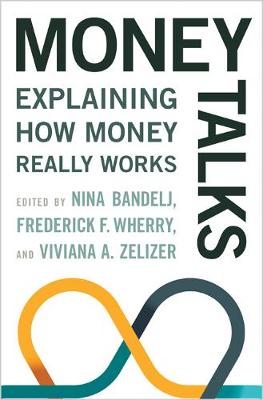
Stock image for illustration purposes only - book cover, edition or condition may vary.
Money Talks: Explaining How Money Really Works
Nina Bandelj
€ 64.77
FREE Delivery in Ireland
Description for Money Talks: Explaining How Money Really Works
Hardback. Editor(s): Bandelj, Nina; Wherry, Frederick F.; Zelizer, Viviana A. Num Pages: 288 pages, 2 halftones. 1 line illus. BIC Classification: JHB. Category: (P) Professional & Vocational; (U) Tertiary Education (US: College). Dimension: 229 x 152. .
The world of money is being transformed as households and organizations face changing economies, and new currencies and payment systems like Bitcoin and Apple Pay gain ground. What is money, and how do we make sense of it? Money Talks is the first book to offer a wide range of alternative and unexpected explanations of how social relations, emotions, moral concerns, and institutions shape how we create, mark, and use money. This collection brings together a stellar group of international experts from multiple disciplines--sociology, economics, history, law, anthropology, political science, and philosophy--to propose fresh explanations for money's origins, uses, effects, and future. Money Talks explores five key questions: How do social relationships, emotions, and morals shape how people account for and use their money? How do corporations infuse social meaning into their financing and investment practices? What are the historical, political, and social foundations of currencies? When does money become contested, and are there things money shouldn't buy? What is the impact of the new twenty-first-century currencies on our social relations? At a time of growing concern over financial inequality, Money Talks overturns conventional views about money by revealing its profound social potential.
Product Details
Publisher
Princeton University Press
Format
Hardback
Publication date
2017
Condition
New
Weight
1g
Number of Pages
288
Place of Publication
New Jersey, United States
ISBN
9780691168685
SKU
V9780691168685
Shipping Time
Usually ships in 15 to 20 working days
Ref
99-15
About Nina Bandelj
Nina Bandelj is professor of sociology and equity advisor to the dean of social sciences at the University of California, Irvine. Frederick F. Wherry is professor of sociology and codirector of the Center for Cultural Sociology at Yale University. Viviana A. Zelizer is the Lloyd Cotsen '50 Professor of Sociology at Princeton University.
Reviews for Money Talks: Explaining How Money Really Works
To anyone interested in money's sociality past, present, and future and its ability to shape and be shaped by groups, collectives, organizations, and institutions this book is integral to the ongoing debate.
-Allister Pilar Plater, American Journal of Cultural Sociology Although Money Talks will be essential reading for anyone interested in understanding the state of scholarship in the sociology of money, the diverse and wide-ranging contributions should make individual chapters valuable to audiences well beyond the confines of this subfield.
-Russell J. Funk, Administrative Science Quarterly The book's central message
that the management and regulation of money should not be left to economists or bankers alone
is one we should all take to heart.
-Rebecca Spang, Financial Times In a world in which monetization seems to be gobbling up every remote corner of social life, Money Talks makes a bold case for the continuing importance not only of subjective meaning in our understanding of money, but of social relations above and beyond exchanges between rational actors. This book brings together an interdisciplinary band of uncommonly smart and influential scholars to take stock of what we know about the myriad uses and meanings of money.
Frank Dobbin, Harvard University The essays featured in Money Talks take their inspiration from Viviana Zelizer's pathbreaking Social Meaning of Money, and show us the horizons on which studies of monetary inventiveness now stand. Admirably, this collection opens new vistas for another generation inheriting, and working in new ways from, this intellectual momentum.
Jane Guyer, Johns Hopkins University Money Talks ranges across the social sciences to show the many faces of a central component to modern life: money. It comes in different forms and guises, and it plays various emotive and budgetary roles. This book proves that our relationship with money is not just the bland, neutral 'medium of exchange' portrayed in classical economics.
George Akerlof, Nobel Laureate in Economics
-Allister Pilar Plater, American Journal of Cultural Sociology Although Money Talks will be essential reading for anyone interested in understanding the state of scholarship in the sociology of money, the diverse and wide-ranging contributions should make individual chapters valuable to audiences well beyond the confines of this subfield.
-Russell J. Funk, Administrative Science Quarterly The book's central message
that the management and regulation of money should not be left to economists or bankers alone
is one we should all take to heart.
-Rebecca Spang, Financial Times In a world in which monetization seems to be gobbling up every remote corner of social life, Money Talks makes a bold case for the continuing importance not only of subjective meaning in our understanding of money, but of social relations above and beyond exchanges between rational actors. This book brings together an interdisciplinary band of uncommonly smart and influential scholars to take stock of what we know about the myriad uses and meanings of money.
Frank Dobbin, Harvard University The essays featured in Money Talks take their inspiration from Viviana Zelizer's pathbreaking Social Meaning of Money, and show us the horizons on which studies of monetary inventiveness now stand. Admirably, this collection opens new vistas for another generation inheriting, and working in new ways from, this intellectual momentum.
Jane Guyer, Johns Hopkins University Money Talks ranges across the social sciences to show the many faces of a central component to modern life: money. It comes in different forms and guises, and it plays various emotive and budgetary roles. This book proves that our relationship with money is not just the bland, neutral 'medium of exchange' portrayed in classical economics.
George Akerlof, Nobel Laureate in Economics
